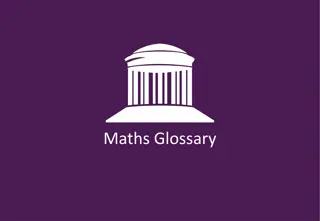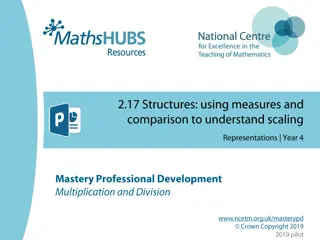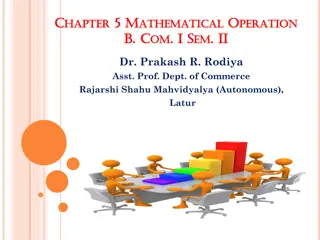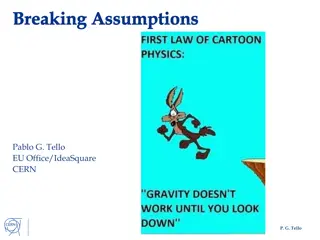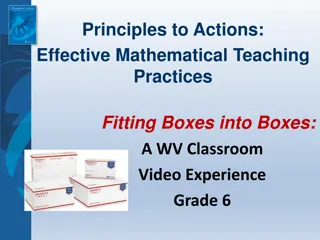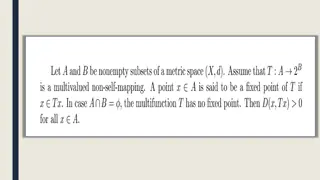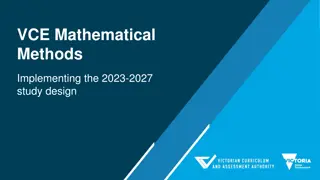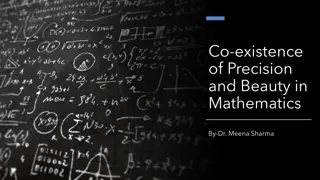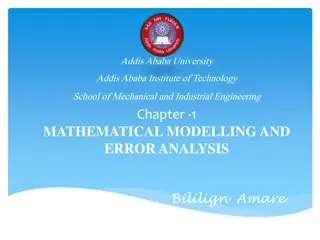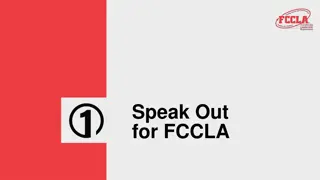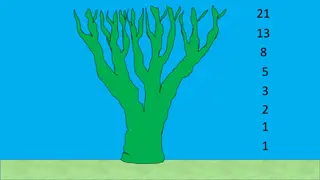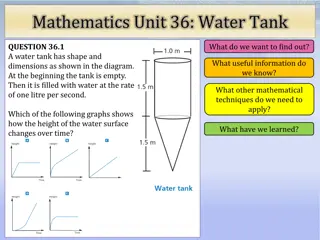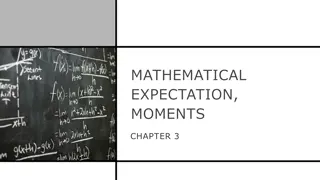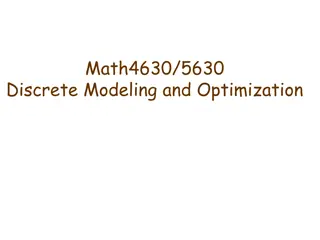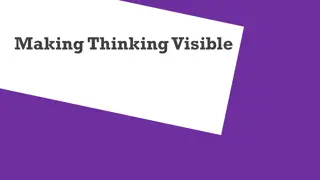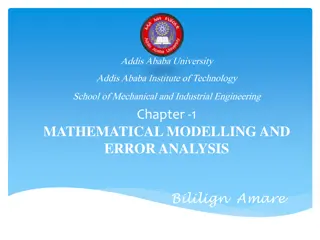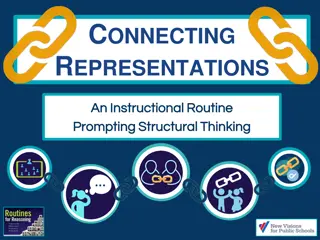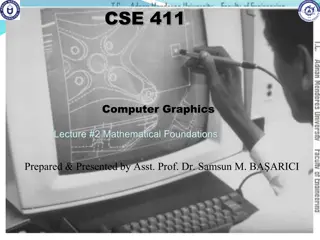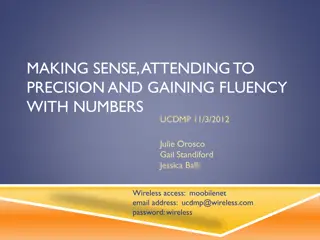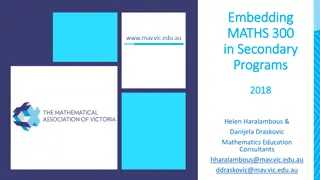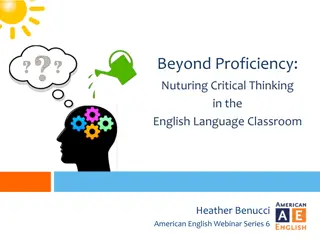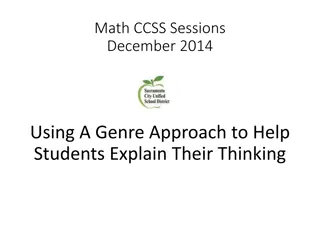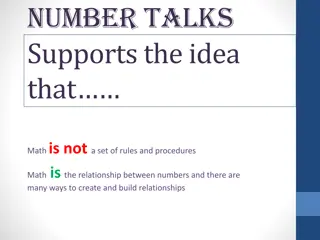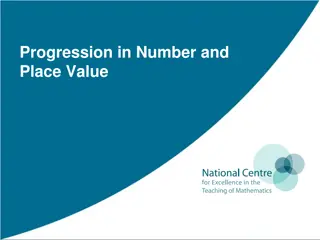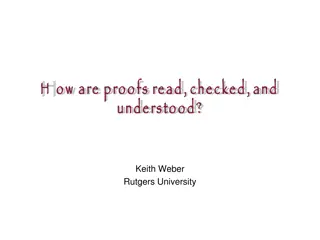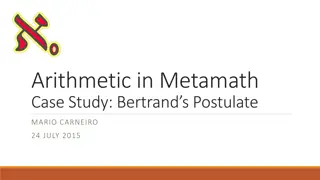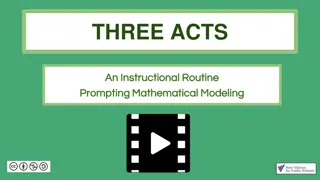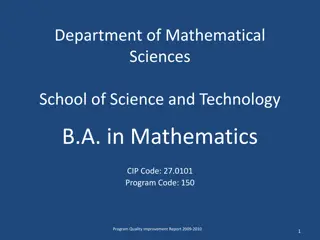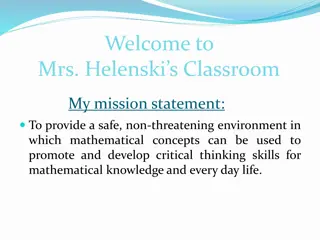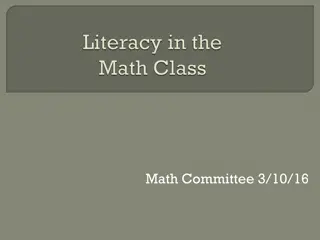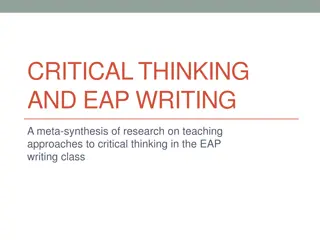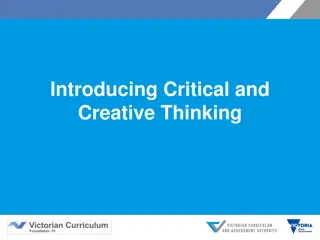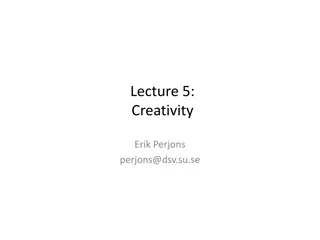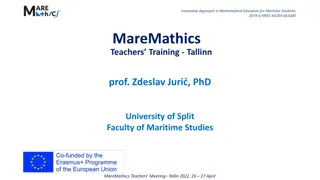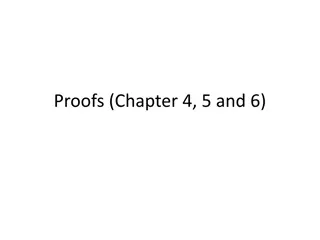Mathematical Checkpoints and Equations Activities for Year 7 Students
Engage Year 7 students in a series of 16 checkpoint activities and 12 additional activities focused on expressions, equations, and mathematical concepts. Explore topics like checks and balances, shape balance, equations from bar models, number line concepts, and more to enhance mathematical understa
3 views • 42 slides
Effective Strategies for Teaching Mathematics: Concrete, Pictorial, Abstract Approach
Utilizing concrete manipulatives, pictorial representations, and abstract symbols is a crucial method for enhancing mathematical understanding. This approach guides students from hands-on exploration to visual representation and ultimately to solving problems with symbols. By engaging in this progre
1 views • 25 slides
Evolution of Mathematical Theories and Proof Systems
Development of mathematical theories such as model theory, proof theory, set theory, recursion theory, and computational complexity is discussed, starting from historical perspectives with Dedekind and Peano to Godel's theorems, recursion theory's golden age in the 1930s, and advancements in proof t
1 views • 29 slides
Mathematical Relationships and Measurements Illustrated with Images
Explore various mathematical concepts such as measurements, proportions, and equations depicted through a series of images. From calculating ribbon lengths to understanding weight conversions, this visual journey provides a unique perspective on mathematical problem-solving and applications.
0 views • 22 slides
Mastering Symbol Substitution in Mathematical Operations
In the realm of mathematical operations, understanding symbol substitution is key to solving questions efficiently. Learn how to interchange mathematical signs and symbols to find the correct answer. With examples and guidance, grasp the concept of symbol substitution and excel in tackling such ques
0 views • 25 slides
Unlocking Creativity and Innovation: Lateral Thinking vs Logical Thinking
Embrace the power of lateral thinking to challenge assumptions, generate new possibilities, and break free from traditional logic. Discover how logical thinking and lateral thinking differ in their approach to problem-solving, and learn how to leverage both methods to spur creativity and innovation.
1 views • 35 slides
Enhancing Mathematical Teaching Practices for Student Success
Explore the evolution of standards-based mathematics education reform through a 25-year journey, emphasizing the crucial role of effective teaching in ensuring mathematical success for all students. Discover the challenges faced in improving math education and the principles that guide meaningful le
0 views • 64 slides
Mathematical Definitions and Theorems Illustrated
In this collection of images, various mathematical concepts are visually presented, including definitions, theorems, and proofs. The slides cover a range of topics in a structured manner, providing a concise overview of key mathematical principles. From foundational definitions to detailed proofs, t
0 views • 12 slides
Critical Thinking in Islamic Methodology
Explore the concept of critical thinking in Islam, identifying key skills and understanding the importance of constructive criticism. Delve into the methodology of thinking in Islam that transcends superficial understanding, enabling individuals to distinguish between good and bad, correct and incor
2 views • 12 slides
Implementing the VCE Mathematical Methods 2023-2027 Study Design
The VCE Mathematical Methods study design for 2023-2027 includes a detailed outline of the curriculum, revisions in Units 1-4, investigations leading to assessments, and FAQs. The study design was the result of thorough consultation and review, published in February 2022 and accredited by VRQA. It f
5 views • 31 slides
Exploring the Harmony of Precision and Beauty in Mathematics
Delve into the intricate relationship between precision and beauty in mathematics as elucidated by Dr. Meena Sharma. Uncover the meaning and definition of these concepts through thought-provoking examples. Discover the nuances of precision and explore the distinction between accuracy and precision.
0 views • 8 slides
Mathematical Modeling and Error Analysis in Engineering
Mathematical modeling plays a crucial role in solving engineering problems efficiently. Numerical methods are powerful tools essential for problem-solving and learning. This chapter explores the importance of studying numerical methods, the concept of mathematical modeling, and the evaluation proces
0 views • 10 slides
Exploring Critical Thinking in a Digital Society
Delve into the realm of critical thinking in the modern era, where information is readily available. Discover how easy access to data impacts our ability to think critically. Explore the importance of critical thinking and its application in today's society. Learn about the six-step critical thinkin
0 views • 32 slides
Exploring Fibonacci Sequence, Bee Hives, and Squares in Nature
Discover the fascinating world of Fibonacci sequence through the lens of bees, sunflowers, and mathematical patterns in nature. Learn about the Fibonacci numbers, bee colonies, the beauty of sunflowers, and the mathematical properties of squares. Dive into the history of Leonardo of Pisa and his con
0 views • 16 slides
Understanding Water Tank Dynamics Through Mathematical Analysis
Explore the dynamics of a water tank being filled at a rate of one litre per second and analyze how the height of the water surface changes over time. Learn about the useful information available, the mathematical techniques required, and examine graphs depicting the changing water levels. Gain insi
0 views • 5 slides
Understanding Mathematical Expectation and Moments in Probability
Mathematical expectation, also known as expected value, plays a crucial role in probability theory. It represents the average outcome or value of a random variable by considering all possible values weighted by their respective probabilities. This concept helps in predicting outcomes and making info
0 views • 17 slides
Understanding Discrete Optimization in Mathematical Modeling
Discrete Optimization is a field of applied mathematics that uses techniques from combinatorics, graph theory, linear programming, and algorithms to solve optimization problems over discrete structures. This involves creating mathematical models, defining objective functions, decision variables, and
0 views • 12 slides
Understanding Making Thinking Visible (MTV) and Its Impact on Learning
Making Thinking Visible (MTV) is a concept that integrates higher-order thinking skills with subject matter learning, aiming to develop students' critical thinking abilities alongside subject knowledge. Rooted in research by Harvard University's Project Zero group, MTV emphasizes sustained thinking
1 views • 20 slides
Understanding Mathematical Modeling and Error Analysis in Engineering
Mathematical modeling plays a crucial role in problem-solving in engineering by using numerical methods. This involves formulating problems for solutions through arithmetic operations. The study of numerical methods is essential as they are powerful problem-solving tools that enhance computer usage
5 views • 10 slides
Enhancing Mathematical Thinking Through Connecting Representations
Explore the instructional routine of connecting representations to promote structural thinking in mathematics. Discover how to connect solutions to graphs, analyze similarities/differences, share connections, create representations, and reflect on learning. Encourage critical thinking and deeper und
0 views • 10 slides
Mathematical Foundations for Computer Graphics: Geometry, Trigonometry, and Equations
This lecture covers essential mathematical tools for computer graphics, including 2D and 3D geometry, trigonometry, vector spaces, points, vectors, coordinates, linear transforms, matrices, complex numbers, and slope-intercept line equations. The content delves into concepts like angles, trigonometr
1 views • 53 slides
Simplifying Residency Shift Scheduling with Mathematical Programming Techniques
This project, led by Professor Amy Cohn and William Pozehl, aims to demonstrate how mathematical programming techniques can simplify the complex task of residency shift scheduling. The Residency Shift Scheduling Game highlights the challenges of manual scheduling and the ease of using mathematical p
1 views • 37 slides
Mathematical Practices and Problem-Solving Approaches
Explore the importance of mathematical practices and problem-solving strategies in gaining fluency with numbers. Discover resources such as King Arthur's Round Table activity and Common Core State Standards for Mathematics to enhance reasoning, precision, and mathematical modeling skills.
0 views • 35 slides
Understanding Rich Tasks in Mathematics Education
Rich tasks in mathematics education are purposeful and engaging activities that encourage problem-solving, critical thinking, and collaboration among students. These tasks are designed to challenge learners at different levels, promote multiple solution strategies, and lead to meaningful learning ou
0 views • 20 slides
Mathematics Achievements and Challenges: Insight into Awards, Exams, and Questions
Delve into the world of mathematics through a detailed exploration of prestigious awards like the Fields Medal, F.R.S. recognition, and the Knighthood of the British Empire. Learn about the historical significance of the Senior Wrangler and the diverse range of topics covered in the Cambridge Mathem
0 views • 14 slides
Enhancing Critical Thinking Skills in the English Language Classroom
Explore the importance of nurturing critical thinking skills in the EFL classroom through understanding the essence of critical thinking, discussing its definitions, and embracing practical ideas for implementation. Delve into the process of critical thinking, integrating Bloom's Taxonomy to foster
0 views • 50 slides
Exploring the Role of Language in Math Instruction
Francis Christie discusses the importance of language as the hidden curriculum in math instruction. The focus is on providing linguistic resources to students for making appropriate language choices to comprehend and construct meaning in mathematical contexts. Using a genre approach, students are en
0 views • 16 slides
Embracing Number Talks for Mathematical Growth
Number Talks support the idea that math is about relationships between numbers, fostering accuracy, efficiency, and flexibility in problem-solving. These discussions allow students to explore various strategies, encouraging a deep understanding of foundational mathematical concepts. Through open-end
0 views • 17 slides
Exploring Number Sense and Place Value in Mathematics Education
This educational content delves into the progression of number sense and place value, focusing on key concepts such as counting in steps, addition and subtraction strategies, fluency in counting, and the development of mathematical language. It highlights the importance of fostering flexibility and
0 views • 19 slides
Understanding and Checking Mathematical Proofs
Reading and understanding mathematical proofs involves careful analysis of logic and reasoning. Mathematicians and students use various strategies to ensure correctness, such as examining assumptions, following step-by-step logic, and verifying conclusions. This process is crucial for grasping the v
1 views • 79 slides
Exploring Metamath: A Computer Language for Mathematical Proofs
Metamath is a computer language designed for representing mathematical proofs. With several verifiers and proof assistants, it aims to formalize modern mathematics using a simple foundation. The Metamath-100 project is focused on proving a list of 100 theorems, with significant progress made in prov
0 views • 17 slides
Mathematical Modeling through Three Acts: A Guided Problem-Solving Approach
Explore the Three Acts instructional routine designed to prompt mathematical modeling skills. Act 1 focuses on understanding the problem, Act 2 involves planning and solving using a model, and Act 3 centers on interpreting conclusions. Engage in identifying problems, quantities, and relationships to
0 views • 19 slides
Mathematics Program Quality Improvement Report 2009-2010 at Department of Mathematical Sciences
This report outlines the student-learning outcomes of the Mathematics program at the Department of Mathematical Sciences. It covers areas such as knowledge of mathematical content, reasoning and proof, mathematical representation and problem-solving, mathematical communication, and knowledge of tech
0 views • 29 slides
Enhancing Critical Thinking Skills Through Mathematical Concepts in Mrs. Helenski's Classroom
Mrs. Helenski's classroom provides a safe environment where mathematical concepts are utilized to develop critical thinking skills for both mathematical knowledge and everyday life. With a focus on promoting metacognition in Geometry Honors, students are challenged to apply, prove, justify, and expl
0 views • 20 slides
Understanding Mathematical Literacy and Its Importance in Education
Recognizing the language of mathematics, understanding symbols, and being able to explain solutions are key components of mathematical literacy. It goes beyond merely answering questions correctly to encompass explaining reasoning and exploring concepts actively. The Standards for Mathematical Pract
0 views • 36 slides
Enhancing Critical Thinking in EAP Writing: A Meta-Synthesis Study
Investigating the teaching approaches to critical thinking in EAP writing classes, this meta-synthesis research delves into the importance of critical thinking, key issues in the literature review, defining critical thinking, enhancing criticality in academic writing, and understanding critical thin
0 views • 14 slides
Enhancing Critical and Creative Thinking in Education
The Victorian Curriculum F-10 emphasizes the development of critical and creative thinking skills among students. By focusing on understanding thinking processes, fostering confidence in evaluating thinking across various contexts, and promoting logical and strategic thinking, this curriculum aims t
0 views • 5 slides
Exploring Creativity and Design Thinking Strategies
Understand the concepts of divergent and convergent thinking in creativity, the importance of empathetic thinking in design, and the role of lateral thinking in generating innovative ideas. Guidelines emphasize the need to allow sufficient time for divergent thinking to foster creative outcomes befo
0 views • 16 slides
Innovative Approach in Mathematical Education for Maritime Students
Explore the innovative approach in mathematical education for maritime students as presented during the MareMathics Teachers Training and Meeting in Tallinn. The sessions covered topics such as mathematical applications in thermodynamics, including partial derivatives, derivations, and integrals wit
0 views • 11 slides
Understanding Mathematical Proofs and Concepts
Explore the world of mathematical proofs through chapters 4, 5, and 6. Delve into terminology, theorems, definitions, divisors, and accepted axioms used in mathematical reasoning. Discover the logic behind proofs and various methods employed in establishing the truth of mathematical statements.
1 views • 101 slides

